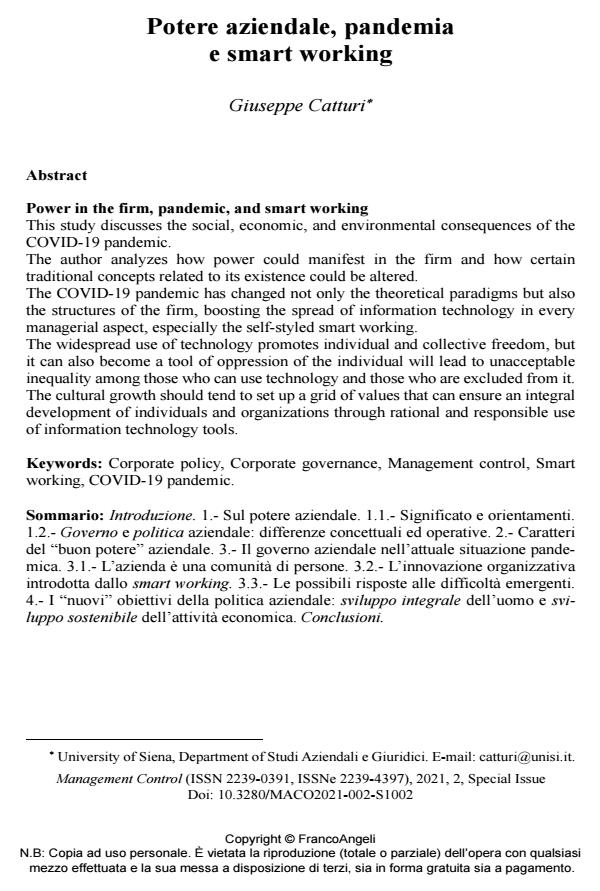Power in the firm, pandemic, and smart working
Journal title MANAGEMENT CONTROL
Author/s Giuseppe Catturi
Publishing Year 2021 Issue 2021/suppl. 2
Language Italian Pages 24 P. 15-38 File size 241 KB
DOI 10.3280/MACO2021-002-S1002
DOI is like a bar code for intellectual property: to have more infomation
click here
Below, you can see the article first page
If you want to buy this article in PDF format, you can do it, following the instructions to buy download credits

FrancoAngeli is member of Publishers International Linking Association, Inc (PILA), a not-for-profit association which run the CrossRef service enabling links to and from online scholarly content.
This study discusses the social, economic, and environmental consequences of the COVID-19 pandemic. The author analyzes how power could manifest in the firm and how certain traditional concepts related to its existence could be altered. The COVID-19 pandemic has changed not only the theoretical paradigms but also the structures of the firm, boosting the spread of information technology in every managerial aspect, especially the self-styled smart working. The widespread use of technology promotes individual and collective freedom, but it can also become a tool of oppression of the individual will lead to unacceptable inequality among those who can use technology and those who are excluded from it. The cultural growth should tend to set up a grid of values that can ensure an integral development of individuals and organizations through rational and responsible use of information technology tools.
Keywords: Corporate policy, Corporate governance, Management control, Smart working, COVID-19 pandemic.
- I "pacchetti" di controllo manageriale nei team virtuali Guido Noto, Carmelo Marisca, Gustavo Barresi, in MANAGEMENT CONTROL 3/2024 pp.43
DOI: 10.3280/MACO2023-003003 - Fostering quality and well-being: remote work strategies in italian SMEs Marino Pezzolo, Ugo Ascoli, in STUDI ORGANIZZATIVI 2/2025 pp.59
DOI: 10.3280/SO2025-002003 - L'azienda è organismo resiliente. Le possibili reazioni alle crisi economiche Giuseppe Catturi, in MANAGEMENT CONTROL 3/2022 pp.177
DOI: 10.3280/MACO2022-003009
Giuseppe Catturi, Potere aziendale, pandemia e smart working in "MANAGEMENT CONTROL" suppl. 2/2021, pp 15-38, DOI: 10.3280/MACO2021-002-S1002